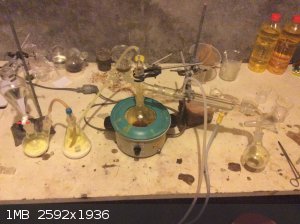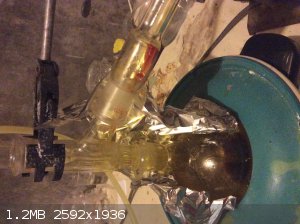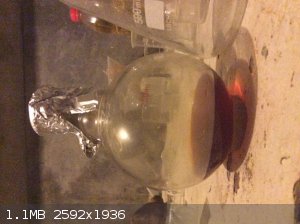| Pages:
1
2 |
gdflp
Super Moderator
      
Posts: 1320
Registered: 14-2-2014
Location: NY, USA
Member Is Offline
Mood: Staring at code
|
|
Quote: Originally posted by CuReUS  | S2Cl2 can be used in place of PCl3 or SOCl2 to convert alcohols and carboxylic acids to alkyl chlorides
and acyl chlorides respectively
btw why don't you try to make it in-situ ? that might prevent formation of SCl2
|
I actually had this idea a couple of weeks ago and was going to try it as soon as I'm done with finals. I was going to try it with oxalic acid to
make oxalyl chloride. I would have done it sooner, but I've been crazy with finishing up term papers and finals. I should have the results of an
experiment by the end of May.
|
|
|
aga
Forum Drunkard
    
Posts: 7030
Registered: 25-3-2014
Member Is Offline
|
|
Quote: Originally posted by blogfast25  | Quote: Originally posted by aga  | [How about taking a known qty of the product, react with a larger volume of water, centrifuge to get the S to the bottom, then drip a known conc of
silver nitrate into the same container with a burette until it stops forming a white precipitate ?
My only worry about adding water & filtering is that i only have 31g of the product and would rather not use all of it overcoming losses due to
filtering. |
You would never see the end-point, trust me. You need the chromate indicator to see when all chloride has been converted to AgCl. Then the chromate
forms red Ag<sub>2</sub>CrO<sub>4</sub>.
I've found the simplest of fixes to the sulphite/chromate problem. Mohr's titration requires slightly alkaline conditions. Adding a pre-determined
amount of hydrogen peroxide will oxidise the sulphite to sulphate but in alkaline condition hydrogen peroxide cannot oxidise chloride to chlorine
(only in acidic conditions does this happen). Sulphate does not interfere because it's far more soluble than AgCl (personal experience confirms that).
For 250 ml of analyte solution only about 1.7 g of your product is needed. And that affords as many titrations as your heart
contends! 
Now it's your call. If you want to proceed, I'll do the calcs for you. |
Yeah !
Sod the factice. I'll make more SxCl2 for that using this new, quicker method.
Cheers ! What's the process bloggers ?
I already have 1.13g of the product diluted to exactly 250ml in water then filtered (as per MM's suggestion) of which about 100ml remains.
There is 25ml of that had an excess of AgNO3 added, and the 1.16g of filter paper is currently drying with the bits in it.
|
|
|
blogfast25
International Hazard
    
Posts: 10562
Registered: 3-2-2008
Location: Neverland
Member Is Offline
Mood: No Mood
|
|
Quote: Originally posted by aga  |
Cheers ! What's the process bloggers ?
I already have 1.13g of the product diluted to exactly 250ml in water then filtered (as per MM's suggestion) of which about 100ml remains.
There is 25ml of that had an excess of AgNO3 added, and the 1.16g of filter paper is currently drying with the bits in it.
|
I'll email you the protocol as a *.doc, see what you think. Then, if you go ahead, you can attach it here with your results, saving you some time in
the write-up.
Re. precipitating and weighing, aka gravimetry, it's a lot trickier than you might imagine. Usually a 0.1 mg analytical balance is
needed [depends on sample size, of course], as well as a suitable filtration medium, good washing practices, tips and tricks to avoid occlusion and
reliable drying methods. VERY easy to get wrong. At a minimum, look up an existing protocol. Getting a dubious result can lead to a
wild goose chase.
AgCl is also light sensitive and can't be calcined too high. But gravimetric determination of silver or chloride as AgCl is definitely in use, no
question about it.
If I thought it was a better option than Mohr's titration, I'd have suggested it, believe me. Gravimetry is about as laborious as volumetry here, but
the latter is slightly easier IMO.
Important point on the synthesis: try and establish a mass balance. Weighing your (tared) reactor before and after chlorination
already gives a rough idea of what you've synthesised (assuming no foolish losses, spills etc).
[Edited on 29-4-2015 by blogfast25]
|
|
|
aga
Forum Drunkard
    
Posts: 7030
Registered: 25-3-2014
Member Is Offline
|
|
Quote: Originally posted by blogfast25  | Weighing your (tared) reactor before and after chlorination already gives a rough idea of what you've synthesised (assuming no foolish losses, spills
etc).
|
DOH !
Why did i not think to do that ?
Buggrit.
|
|
|
blogfast25
International Hazard
    
Posts: 10562
Registered: 3-2-2008
Location: Neverland
Member Is Offline
Mood: No Mood
|
|
Re-reading len1’s notes on the preparation of S<sub>2</sub>Cl<sub>2</sub>/SCl<sub>2</sub>:
http://www.sciencemadness.org/talk/viewthread.php?tid=10377#...
… I quote:
| Quote: | | In addition both S and Cl2 are soluble in S2Cl2 to a great extent (corresponding to stoichometries of about S5Cl2 at the one extreme, and S2Cl5 at the
other) - it is clear therefore that it is difficult to differentiate precisely the amount of mixture and chemical compound in the S/Cl system […]
|
len1 did distil his S<sub>2</sub>Cl<sub>2</sub> and his stoichiometry assessment (presumed formula) was based on a mass
balance.
So I think an accurate mass balance for your next synthesis is key here.
|
|
|
aga
Forum Drunkard
    
Posts: 7030
Registered: 25-3-2014
Member Is Offline
|
|
Mass balance ?
Sorry to seem Dense.
Does that mean keeping track of all the weights from start to finish ?
|
|
|
blogfast25
International Hazard
    
Posts: 10562
Registered: 3-2-2008
Location: Neverland
Member Is Offline
Mood: No Mood
|
|
Quote: Originally posted by aga  | Mass balance ?
Sorry to seem Dense.
Does that mean keeping track of all the weights from start to finish ? |
Weigh your sulphur, then weigh your product at the end of your reaction. 'On paper' that allows you to determine obtained stoichiometry, if we assume
all weight increase is due to reaction, not physical dissolution (absorption).
But going by len1, dissolved ('free') sulphur and/or dissolved ('free') chlorine can not be excluded a priori. It's a bit of a pain, this S/Cl system.
[Edited on 30-4-2015 by blogfast25]
|
|
|
aga
Forum Drunkard
    
Posts: 7030
Registered: 25-3-2014
Member Is Offline
|
|
Quote: Originally posted by Molecular Manipulations  | | Instead of Mohr's, how about reacting a known quantity with water, filter off the sulfur and add an excess of silver nitrate to precipitate chloride.
After taking into account silver chloride's solubility product (very small) the total chlorine contant can be known. |
OK. Did that and arrived at a mm of 134.96 g/mol
I guess that means it's all S2Cl2
|
|
|
j_sum1
Administrator
       
Posts: 6320
Registered: 4-10-2014
Location: At home
Member Is Offline
Mood: Most of the ducks are in a row
|
|
Congratulations. Well done.
|
|
|
Tdep
National Hazard
   
Posts: 519
Registered: 31-1-2013
Location: Laser broken since Feb 2020 lol
Member Is Offline
Mood: PhD is done! It isn't good but it's over lol
|
|
I got some new glassware so I though I'd give this a try. Worked like a dream! Well, a very bad smelling dream. Started with 25g sulfur, ended with
52.1g of product which corresponds to a 99% yield according to complete conversion to S2Cl2. Ran for 3 hours, went smoothly, no
sulfur left in reaction flask. My end goal is sulfur nitride so I don't need to worry about complete conversion, as both chlorides are referenced to
work fine in the synth.
  
|
|
|
aga
Forum Drunkard
    
Posts: 7030
Registered: 25-3-2014
Member Is Offline
|
|
Cool !
Nice one.
It does Honk a bit dunnit ?
|
|
|
Tdep
National Hazard
   
Posts: 519
Registered: 31-1-2013
Location: Laser broken since Feb 2020 lol
Member Is Offline
Mood: PhD is done! It isn't good but it's over lol
|
|
It does. Sulphur chemistry is always one to observe with eyes only. Gotta lower my limit of acceptable chlorine exposure too, throat is kinda
scratchy. Nothing an excess of chocolate milk won't fix though.
How are you storing yours aga? I don't want to stopper it for risk of chlorine build up in the flask but don't want it destroyed in the few days until
I can use it
|
|
|
aga
Forum Drunkard
    
Posts: 7030
Registered: 25-3-2014
Member Is Offline
|
|
I had mine in a ground-glass stoppered RBF.
When i opened it after 24Hrs there had been considerable pressure build-up.
After that it went in a Simax 500ml bottle (plastic top).
Since the sulphur crystals precipitated out there has been no noticeable pressure build-up.
I filtered and put back in the stoppered RBF.
(also went and checked to see if it had exploded, and no, it hadn't).
Edit: this is about 70mls S2Cl2.
[Edited on 25-5-2015 by aga]
|
|
|
blogfast25
International Hazard
    
Posts: 10562
Registered: 3-2-2008
Location: Neverland
Member Is Offline
Mood: No Mood
|
|
Quote: Originally posted by aga  |
Since the sulphur crystals precipitated out there has been no noticeable pressure build-up.
|
Isobaric conversion:
S2Cl2 === > S + SCl2
Determine Cl content on supernatant residue AT ONCE! 
Even simpler: weigh S and supernatant residue. Do mass balance to determine conversion rate.
[Edited on 25-5-2015 by blogfast25]
|
|
|
aga
Forum Drunkard
    
Posts: 7030
Registered: 25-3-2014
Member Is Offline
|
|
Residue ?
That's the Product !
|
|
|
blogfast25
International Hazard
    
Posts: 10562
Registered: 3-2-2008
Location: Neverland
Member Is Offline
Mood: No Mood
|
|
Errm... rest of the product! 
|
|
|
aga
Forum Drunkard
    
Posts: 7030
Registered: 25-3-2014
Member Is Offline
|
|
Can't quite grasp your lingo old chap.
Do you want me to bag a brace of bounders then squash the bosh with a flibbertooty ?
Crashing the crate into the briney is a given !
What! What! Hussars!
|
|
|
| Pages:
1
2 |